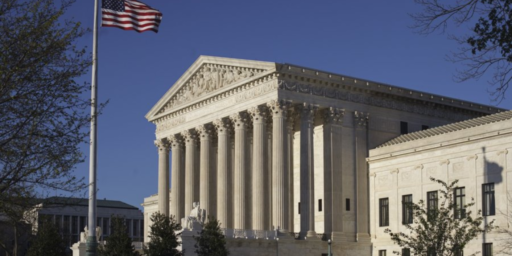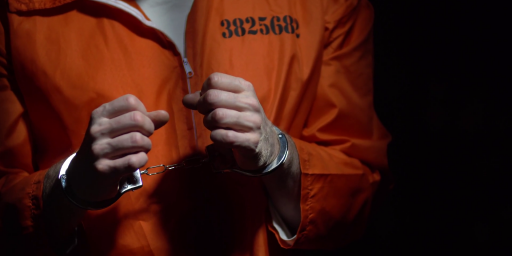Washington Supreme Court Declares Life Without Parole For Juveniles Unconstitutional
Another landmark decision from the Washington State Supreme Court.

Late last week, the Washington State Supreme Court ruled that sentencing a juvenile to life without the possibility of parole is unconstitutional even in cases where a juvenile is charged and convicted as an adult:
Washington state’s Supreme Court on Thursday ruled that sentencing juveniles to life in prison without the chance for parole is unconstitutional.
The court ruled 5-4 to uphold a state court of appeals ruling that a statute that allows 16- and 17-year-olds to be sentenced to life without parole violated the state’s ban on cruel punishment.
“We hold that sentencing juvenile offenders to life without parole or early release constitutes cruel punishment and, therefore, is unconstitutional,” Justice Susan Owens wrote in the Supreme Court’s majority opinion.
The state had challenged the court of appeals’ ruling, arguing that it “subverted the constitutional authority of a duly-elected legislature to fix punishments for criminal offenses” by ruling the sentence unconstitutional.
The United States Supreme Court ruled in 2012 that life sentences for anyone under the age of 18 were unconstitutional.
More from The Seattle Times:
A divided Washington Supreme Court on Thursday held that a life sentence for juveniles convicted of aggravated murder constitutes cruel punishment and is unconstitutional.
The justices ruled 5-4 that trial courts may not impose a minimum term of life without the possibility of release for 16- and 17-year-olds convicted of aggravated first-degree murder, with Justice Susan Owens writing in the majority opinion that “the direction of change in this country is unmistakably and steadily moving toward abandoning the practice of putting child offenders in prison for their entire lives.”
But the minority opinion, authored by Justice Debra Stephens, argued the majority is reinterpreting a 2012 U.S. Supreme Court decision addressing mandatory juvenile life sentences, Miller vs. Alabama — known as the Miller decision — and that the majority has improperly eliminated trial judges’ discretion to sentencing 16- and 17-year-olds to life in prison for the crime of aggravated murder.
Before the state Supreme Court abolished the death penalty last week, finding capital punishment to be imposed in an arbitrary and racially-biased manner, the only possible punishments for adults convicted of aggravated murder was life in prison without the possibility of release, or death.
Thursday’s ruling upheld a state Court of Appeals decision in the case of Brian Bassett, who was 16 when he fatally shot his parents with a stolen rifle and drowned his 5-year-old brother in a bathtub at the family’s home in McCleary, Grays Harbor County, in 1995.
The appeals court last year agreed with Bassett, now 39, that a sentence of life in prison without the possibility of release for juvenile defendants is unconstitutional because it violates the state’s prohibition against cruel punishment. Prosecutors appealed to the Supreme Court.
“It’s an excellent decision. The U.S. is the only country in the world that sentences people to life for something they did as a child,” said Bassett’s attorney, Eric Lindell. “It’s very consistent with our state constitution and the science that’s developed and proved the minds of juveniles are different from the minds of adults.”
But Grays Harbor County Prosecutor Katie Svoboda said she was “frustrated” by the decision.
“When someone commits a triple homicide like Bassett did, that wasn’t a youthful impulse kind of crime, like a drug deal gone bad or a robbery gone bad,” she said. “It was a premeditated triple homicide crime, including a 5-year-old child who was drowned in a bathtub. I think the facts of the case matter and the victims matter.”
According to the state Department of Corrections, there are 30 inmates in Washington who are currently serving life sentences without the possibility of release for killings committed when they were 17 or younger and two of them — including Bassett — were resentenced to life without parole.
With Thursday’s decision, Washington now joins 20 other states and Washington, D.C., in abolishing life without parole for juvenile offenders — and is representative of the ongoing evolution in the way the criminal-justice system treats juveniles who are convicted as adults.
The shift is based on neuroscience that’s proven adolescent brains aren’t fully developed until age 25 — and as a result, juveniles are considered less culpable than adults for criminal behavior. Science also has shown that adolescents possess a greater propensity for change and rehabilitation compared to adults.
As with the decision earlier this month finding the death penalty unconstitutional, the Court here basis its opinion here on the Washington State Constitution rather than the Federal Constitution. This is important because it essentially means that the state is precluded from appealing the matter to the U.S. Supreme Court. As a general rule, the Supreme Court has declined to review rulings from the state courts that are based on state law, especially when those rulings come from the Supreme Court of the state in question. Generally speaking, this is based on principles of judicial deference and the idea that a state’s Supreme Court is a better judge of the interpretation of state laws than the Supreme Court in Washington, D.C. could be. As a general rule, the only time the Supreme Court will accept jurisdiction in any case like this is if there is a credible Federal issue that would overrule the state Constitutional issues. Since that doesn’t appear to be the case here, it’s probable that the Washington Attorney General won’t even bother to seek review from the Justices in Washington, D.C.
This decision is the latest in a line of cases at the state and Federal levels that have limited the sentences that can be imposed on juvenile offenders even in cases of cold-blooded murder. In Roper v. Simmons 543 U.S. 551 (2005), the U.S. Supreme Court that defendants cannot be sentenced to death for crimes committed when they were juveniles regardless of the facts of the case, a ruling that brought the United States in line with much of the rest of the world. This ruling overturned the Court’s 1989 ruling in Stanford v. Kentucky 492 U.S. 361 (1989) and invalidated laws in 25 states that allowed people who had committed crimes as juveniles to be sentenced to die under certain circumstances. Five years later in Graham v. Florida 560 U.S. 48 (2010), the Court ruled that juveniles could not be subjected to a mandatory sentence of life without parole in non-homicide cases, but left open the possibility that they could still receive that sentence if convicted of an offense involving homicide. Graham was followed by Miller v. Alabama 560 U.S. 460 (2012) in which the Court extended the ban on mandatory life without parole sentences to homicide cases, but left open the possibility that such a sentence could be imposed after a sentencing hearing. With this ruling, the Washington Supreme Court has ruled that defendants in the Evergreen State who committed any crime as a juvenile cannot be sentenced to life without parole under any circumstance.
Based on these decisions, the result here seems to me to be both an accurate reflection of what the law should be, and a natural extension of the direction that sentencing law has been taking with regard to juvenile defendants. Generally speaking, those rulings at both the state and Federal level have been based on the fact that the brains of young adults aren’t really fully developed until roughly the age of twenty-five. In part because of that, the idea of sentencing someone to death, to pick the most extreme example, for a crime they committed as a juvenile constitutes ‘cruel and unusual punishment’ barred by both the Eighth Amendment and by comparable provisions of the Washington Constitution. Additionally, the idea of sentencing someone to life without parole is essentially based on the conclusion that, based on the crime they committed, on their previous criminal record, or both, for crimes they committed as a juvenile essentially means sentencing someone to prison for what could be as long as sixty or seventy years without the possibility of ever being considered for release. Under the circumstances, this seems like exactly the kind of cruel and unusual punishment that the Eighth Amendment and its equivalent provision in the Washington Constitution were meant to prevent.
Here’s the opinion:
Washington v. Bassett by on Scribd






I’m not sure there is much else to say here than “good” and “it’s about time.”
I don’t disagree with the decision, but I do think that because the decision is about the Bassett case, the optics are unfortunate. For my part as a resident of Washington, I don’t have the misgivings about him doing actual life that I would with other potential cases.
And if any of you are thinking “well, YOU’RE not a very nice person,” you’re probably right.
@Just nutha ignint cracker:
The issue is that with any criminal justice reform issue it’s always easy to find the bad optics case. I agree that Bassett is an unfortunate case to build this on. But the fact remains that this effects a lot more people that Bassett.
What you are feeling is entirely human. That said we need to acknowledge that and move beyond it.
Besides the reality is that you can essentially be denied parole for blinking. So I don’t expect Bassett is going anywhere.
@mattbernius: I get your points and agree that the decision is correct. It still is unfortunate that this was the case. Even though I live in the heartland of the Left Coast, we have plenty of RWNJs who will find stuff to complain about and this will become a hobby horse for them.
@Just nutha ignint cracker: we have plenty of RWNJs who ALWAYS find AN INFINITE NUMBER OF THINGS to complain about and this will be JUST ANOTHER DEAD horse for them TO BEAT ON.
In other words, SSDD, and different topic too.
I agree with this on the whole, but there should be thorough diagnosis and studies done before a person with a violent history is set loose on the streets.
And their records should not be sealed. There have been reports of juveniles with violent records returning to schools. The principal and teachers were not informed of their record. Who would want their children in a classroom sitting next to a strangler?